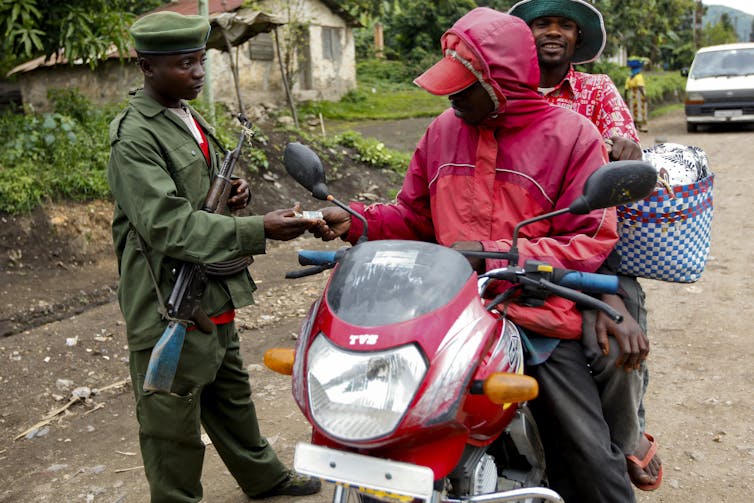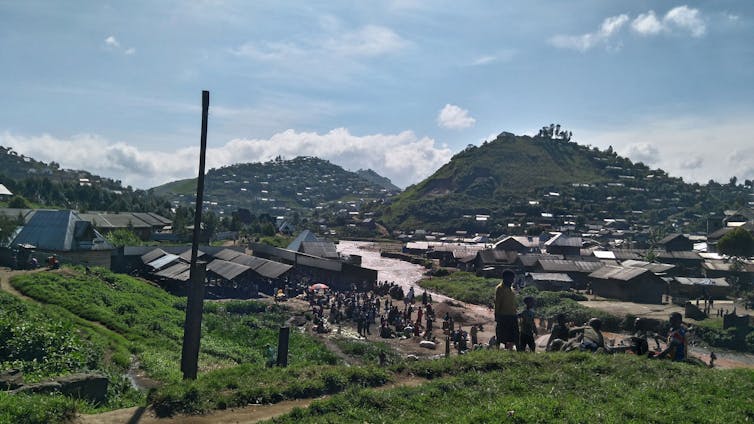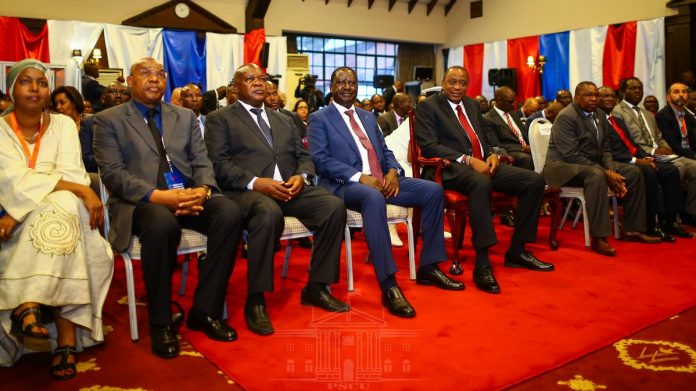My dear Christians of Nyeri,
My dear Daughters and Sons in Christ,
Christ has Risen! Alleluia Alleluia!!
“And suddenly there was a violent earthquake, for an angel of the Lord, descending from heaven, came and rolled away the stone and sat on it. His face was like lightning, his robe white as snow. The guards were so shaken by fear of him that they were like dead men. But the angel spoke; and he said to the women, ‘There is no need for you to be afraid. I know you are looking for Jesus, who was crucified. He is not here, for he has risen, as he said he would. Come and see the place where he lay, then go quickly and tell his disciples…’ ” (Mat. 28, 2-7)
We have walked with Jesus these last forty days of Lent, making ready our souls, our
families and our Church to celebrate the Paschal mystery. We have denied ourselves and fasted, we have made efforts to perform works of mercy, we have especially tried to walk the path of repentance and conversion, in order to uproot the habits of sin in our lives.

The climax of all has been the Holy week which we lived even more intensely, constantly looking at the face of Jesus, watching his every gesture and listening to his voice, in the silence of our hearts.
Throughout this period, the Church invites us to contemplate the Face of Jesus. God the
Father wanted us to be able to see His face, in the human face of Jesus. We saw him in the little Child in Bethlehem, and even as a Child, his eyes and face spoke to us of “Love”. We were at the side of the path, as He rode to Jerusalem on a humble donkey, and there too, his eyes land on us as we watch him pass… Now we see him in his risen Glory. What word does he leave us?
“Seek His face! It is your face all Lord that I seek” (Ps. 27,8)
The Face of Jesus is beautiful to behold. But in the Holy week, that face is covered by the
evil of men. We have seen him slapped, spat on, and with the blood covering his face from the crown of thorns. Our world has covered the face of Jesus with its sins and man’s sinful acts. Today, the news we read or watch speaks mainly of the atrocious actions of the evil one. These last days especially have caused great sorrow to hear of so many cruel murders among couples, siblings, and even friends. The most cruel acts that we can only call beastly, where man has lost his humanity, and become worse than an animal. Yet God created man
in his image and likeness. His face is truly in the face of that person who has been killed or abused or mistreated. What has happened that we no longer recognize the face of Jesus?
Since we call ourselves Christian and God-fearing, we still come out to see him pass on his way to Jerusalem, singing “Hosanna”. But we really don’t want him to look at us, and when the moment comes when we are asked to choose, we cry out, ‘free “Barabbas” the thief’, and to Jesus we shout “Crucify him”. We refuse to recognize his face, as a Son of God and Messiah, because we choose evil in the place of good. Every time we involve ourselves with the evil actions of society, even when many people do it, we, like Judas, betray Jesus with a Kiss. We are pretenders and hypocrites. We have decided to recognize his face outwardly, but inwardly we have denied and betrayed him.

“Now the traitor had arranged a sign with them saying, ‘The one I kiss, he is the man.
Arrest him. So he went up to Jesus at once and said, “greetings, Rabbi, and kissed
him.” (Mat. 26, 48-49)
“Jesus said, ‘Judas are you betraying the Son of man with a kiss?’” (Lk. 22, 48)
We have seen the face of Jesus, the face of Christianity, the face of our Catholic Church
covered with the ugliness and dirt of our behavior. The terrible crimes are being done by us, Catholics and Christians; We are unfortunately deeply involved in dishonesty and corruption; we refuse to abide to the laws and always seek short cuts: Couldn’t we please try wipe this Face of Jesus like Veronica? We are involved in hideous crimes of abortion, and some of our Christian and even Catholic doctors are in the front line advocating to legalize the killing of babies: Couldn’t we make resolve to wash this face of Christ? We are the ones doing the business of betting and gambling, to feed the monster of greed, that leads
to theft and poverty; Couldn’t we try to wash this kind face of our Jesus? Our own children, our brothers and sisters, are involved in our homes and neighbors in many immoral plans, and we don’t have the courage to assist and correct them: Shouldn’t we decide to wash this
face of dear Lord that has been spat on so many times? This is Christ looking down at us from the Cross, with a Loving face, inviting us to change. His gaze and look, is one of Love and Mercy. For all these, our betrayals, our negligence and evil actions, we crucified him on good Friday. But we need not be discouraged. We should not lose hope because he is the one who comes again to seek us.
As we witnessed in Holy Thursday his love has no measure! He washes the feet of his
disciples, our feet. This is a way of revealing his merciful and loving face, in humility. His
face is hidden in humility.
“Although he was in the form of God, did not count equality to God as something to be
grasped. But he emptied himself taking the form of a slave… and he was humbler yet,
even to accepting death, death on a cross” (Phil 2, 6-8)

But the greatest news is that on Easter Sunday, He rises Glorious, full of Joy and beaming with Hope. His radiant face has replaced the disfigured face. No matter how much they try to distort the message of Christ, or seek to discredit the Church, the Glorious face of Christ will shine and overcome those who are determined to proclaim the failure of Christianity.
We must courageously proclaim the risen Lord, by showing that we can live every aspect of
our faith, and show his glorious face so needed by this rotten world. There is Hope of restoring the real Face of Christ to our world. There is Hope of sharing his Glory in heaven even if we must also pass through persecution, and have our face spat on by
others. Jesus rises with power and the soldiers tremble and fall. The evil will crumble before us, through our determination to live our Baptismal calling.
What we need is a firm Faith!
“There is no need for you to be afraid. I know you are looking for Jesus, who was
crucified. He is not here, for he has risen, as he said he would.” We must make him rise in our hearts, and in our attitudes. It is true we betrayed him. But
we must make him rise again, by washing his face and returning to his fold through a true conversion.

My dear Christians, we must decide to discover his face in the Sacraments especially the Eucharist. He waits for us to see him and experience his merciful gaze. He has humbled himself so much, so that we may not fear to approach him in the Eucharist. The Silent Face of Jesus in the Eucharist waits for you and me. Let us make time for Adoration in our parishes. Our families are the image of God. There too the face of Christ must be visible. That is why I
am insisting that we must come to the Sacrament of Matrimony to welcome Christ into our families. We can restore his face in the love and forgiveness within our families. You will manage to see the Face of Jesus in your wife or Husband, your son or daughter, your father or your mother, who deserves your love even if he or she is sinful. Wash their faces with love
and let Christ be seen.
The Church has encouraged us to reflect this year on the Theme of “Baptized and Sent”.
Pope Francis has asked us to commemorate in October the sense of Mission in the Church. What that means is that we must reveal the face of Christ to others, and teach them to listen to his voice. As Baptized persons, we have been given the mission to witness.
“He is risen, he is not here… Come and see the place where he lay, then go quickly and
tell his disciples…”
We are sent to witness with our word and with our life. That is why we must take our
Catholic faith seriously. It does not allow any holidays or moments of excuses. Often we
have really abused the name Christian and Catholic, by the things we have allowed
ourselves to be involved in. We cannot live only a part of the ten commandments, but all the commandments of the Lord. We cannot try only to live some virtues, but rather all virtues.
We cannot go back to betray Christ with a “Kiss” of deception and appearances. God knows our heart and sees our every intention. We must learn to forgive from our heart like Christ, without seeking revenge. Our people need new lessons on Gods mercy: “Be merciful as your heavenly Father is merciful”. Then we won’t witness these hate incidents…

This Easter, Christ wants the joyful “Alleluia” in the hearts of those who have realized their weaknesses like Peter, but now contrite, wish to follow him up to the end, with the risen Lord. We are sent first to our families, where we witness in Love, the joyful face of Christ.
We are sent to the society and those around us, especially the sick, poor and forgotten, so as to show the merciful face of Christ in our service. We are sent to those who still want to disfigure the face of Christ, those who don’t believe, to reveal to them, the Loving Face of our Saviour’s which looks for them: “Father forgive them for they do not know what they are doing”.
Our Mother Mary, is also the first messenger of the good news of the resurrection. She
awaited her Son’s resurrection. With faith, after the Pentecost, she confirmed and
encouraged the Apostles to go out and proclaim the Gospel of Christ, the Gospel of Love and Mercy. May she teach us to be true Apostles determined to live their Baptism. She will encourage us when we meet discouragement on our way, by proclaiming that, Christ has Conquered Sin, Evil and darkness.
“Queen of Heaven rejoice Alleluia… For the Lord is risen indeed alleluia!” I send you all my affectionate Easter Blessing.
Archbishop Anthony Muheria
Archbishop of Nyeri


























